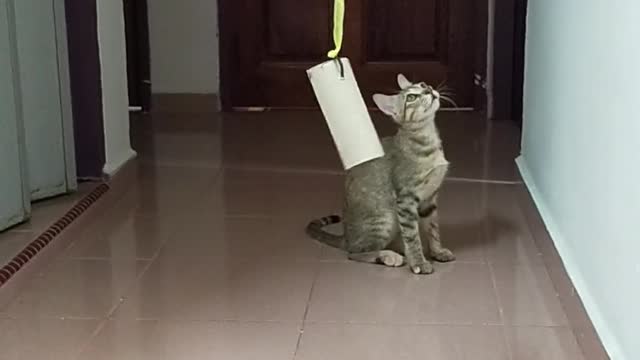Premium Only Content

The cat is acting crazy
The cat is acting crazy.
The cat is similar in anatomy to the other felid species: it has a strong flexible body, quick reflexes, sharp teeth and retractable claws adapted to killing small prey. Its night vision and sense of smell are well developed. Cat communication includes vocalizations like meowing, purring, trilling, hissing, growling and grunting as well as cat-specific body language. A predator that is most active at dawn and dusk (crepuscular), the cat is a solitary hunter but a social species. It can hear sounds too faint or too high in frequency for human ears, such as those made by mice and other small mammals.[7] Cats also secrete and perceive pheromones.[8]
Female domestic cats can have kittens from spring to late autumn, with litter sizes often ranging from two to five kittens.[9] Domestic cats are bred and shown at events as registered pedigreed cats, a hobby known as cat fancy. Population control of cats may be affected by spaying and neutering, but their proliferation and the abandonment of pets has resulted in large numbers of feral cats worldwide, contributing to the extinction of entire bird, mammal, and reptile species.[10]
Cats were first domesticated in the Near East around 7500 BC.[11] It was long thought that cat domestication began in ancient Egypt, where cats were venerated from around 3100 BC.[12][13] As of 2021, there were an estimated 220 million owned and 480 million stray cats in the world.[14][15] As of 2017, the domestic cat was the second-most popular pet in the United States, with 95.6 million cats owned[16][17][18] and around 42 million households own at least one cat.[19] In the United Kingdom, 26% of adults have a cat with an estimated population of 10.9 million pet cats as of 2020.[20]
Etymology and naming
Taxonomy
Evolution
Characteristics
Senses
Behavior
Lifespan and health
Ecology
Interaction with humans
See also
References
-
 0:41
0:41
LiamNel
2 years agoCrazy cat
16 -
 1:03:51
1:03:51
Flyover Conservatives
1 day agoGeneration Z’s Revolution: 17 Year Old Author on the Return of Faith, Family, and the End of Feminism - Hannah Faulkner; Economic Update - Dr. Kirk Elliott | FOC Show
32.2K2 -
 1:12:43
1:12:43
Adam Does Movies
9 hours ago $16.89 earnedMoviegoers Are Singing Now! + Lilo & Stitch + Sonic 3 - LIVE!
70K7 -
 1:26:05
1:26:05
Donald Trump Jr.
12 hours agoRegime Media Imploding: What’s Next for MSNBC? Plus Michael Knowles & Alex Marlow | TRIGGERED Ep.194
220K204 -
 37:26
37:26
Glenn Greenwald
10 hours agoGlenn Takes Your Questions: On Trump's Cabinet, The G20 Summit, and More | SYSTEM UPDATE LOCALS SPECIAL
85.5K34 -
 2:10:20
2:10:20
We Like Shooting
17 hours ago $2.14 earnedWe Like Shooting 586 (Gun Podcast)
21K -
 52:14
52:14
Uncommon Sense In Current Times
11 hours ago $0.65 earned“Pumpkin Pie Politics: Bridging the Thanksgiving Divide to Protect The Family"
15.7K1 -
 1:01:28
1:01:28
The StoneZONE with Roger Stone
6 hours agoWhy Jack Smith Owes Americans Millions of Dollars for Fake Investigations | The StoneZONE
36.5K5 -
 3:50:40
3:50:40
Tundra Gaming Live
11 hours ago $2.61 earnedThe Worlds Okayest War Thunder Stream
35.3K -
 2:22:30
2:22:30
WeAreChange
9 hours agoBREAKING: Biden Admin Could SEND NUKES To Ukraine?! UK & France To Send Troops? w/ Roger Stone
52.3K17